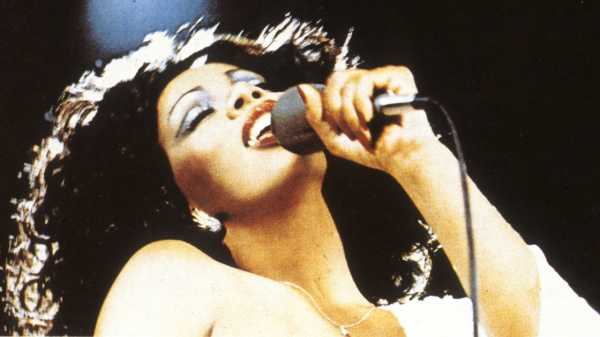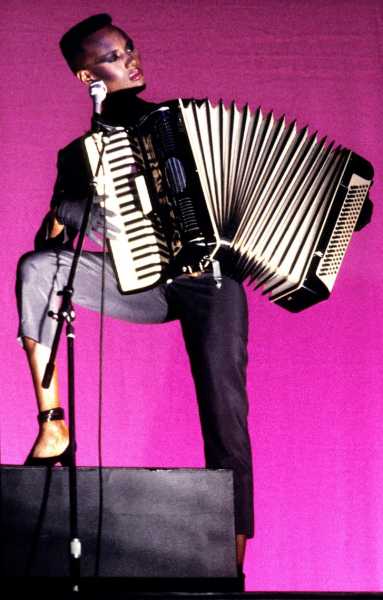
Disco may never overcome the collective yearning for the “classic” rock era it supposedly ruined. Synthetic, tacky, decadent, dead—disco’s had plenty of invective hurled at it, even as it persists in the form of late-night infomercials and books of louche Studio 54 photographs. It’s easier to snort at the processed cheese of disco’s end than to celebrate its jagged beginnings, buoyed largely by gay, black, and Latino audiences who found a second home (or a first) on the dance floor.
This spring, two projects revisit two of disco’s reigning queens, with mixed success. One overexplains its subject, and the other explains too little. In the broad outline, Donna Summer and Grace Jones had plenty in common: both are black women who made music careers in the seventies, translating their bold sexuality to the dance floor. Both were molded by European men (for Summer, the music producers Giorgio Moroder and Pete Bellotte; for Jones, the French director-photographer Jean-Paul Goude). Both grew up in the church, though Summer became a born-again Christian at the height of her fame, and Jones never looked back. Both weathered physical abuse, record-industry greed, controversy (more on that soon), and the decline of disco, the genre that catapulted them to fame. “I definitely had one foot in the 54 world, but not really for the music—more for the theatre of the place, the combination of people craving spontaneous excitement,” Jones writes in her autobiography, “I’ll Never Write My Memoirs.” “Musically, I was going with the flow along with the DJs who were resisting disco as a trend, as a headline, a dead end.”
Summer, who died in 2012, also tried to go with the flow, pivoting to pop songs such as “She Works Hard for the Money” in the eighties, but she didn’t share Jones’s flair for reinvention, and “Queen of Disco” became her permanent honorific. “For the longest time, people had me convinced there was something wrong with this music,” she tells us at the beginning of “Summer,” a new Broadway bio-musical at the Lunt-Fontanne Theatre. “ ‘Dance music.’ Like the term was some kind of insult.” The layered rhythms of her 1977 hit “I Feel Love”—a precursor to today’s electronic dance music—pulse in the background, as Summer (LaChanze) is joined by a chorus of women in John Travolta drag. “Once we found that bass line, it was a whole new world,” she continues. “A world of mystery and androgyny, blurring all the lines.”
Soon we’re off to the races, with no fewer than twenty of Summer’s infectious hits (ending, inevitably, with “Last Dance”) shoehorned into a Wikipedia account of her life. In the late sixties, Summer moved from Boston to Germany, to be in a production of “Hair.” There, she teamed up with Moroder and Bellotte and recorded her breakout hit, “Love to Love You Baby,” which was extended into a seventeen-minute dance track. The story of the recording session—Summer turned out all the lights and lay on the floor, making orgasmic noises—is, naturally, recreated onstage. If Summer was the Queen of Disco, the director Des McAnuff is the King of Slick. McAnuff, who helmed “Jersey Boys,” uses many of the same tricks in “Summer”: familiar melodies building with anticipatory excitement, glittering scenery that never stops moving, and multiple narrators whisking the action along. Since there were four Jersey Boys but only one Summer, McAnuff splits her into three, played at different ages by LaChanze, Ariana DeBose, and Storm Lever—each of them dynamite. There’s almost enough stagecraft to make you overlook the fact that the show never finds a coherent story to tell. Incidents from Summer’s life fly by, from her childhood cameo in a murder case to her religious reawakening, strung together with truisms such as, “Once you’re on a roller coaster, it’s real hard to get off.” McAnuff is counting on it.
Least convincing is the musical’s treatment of Summer’s reported homophobic comments at a 1983 concert (“God made Adam and Eve, not Adam and Steve”), which cost her many of her ardent fans. She later apologized, but denied reports that she had called AIDS a divine punishment. Toward the end of “Summer,” she sits at a piano, surrounded by vintage photos of gay men, and explains that the “Adam and Steve” comment was a “bad joke.” Then she declares that “God made Adam and Steve and Eve and Louise.” It’s a cheap applause line, and the musical’s attempts to fashion a “woke” Donna for 2018 miss an opportunity to interrogate her contradictions: the born-again Christian who was also a gay icon. (When she died, Hilton Als wrote about Summer’s queer appeal.)

Grace Jones performs at the Carré Theatre, in Amsterdam, on September 23, 1981.
Photo by Rob Verhorst / Redferns / Getty
Grace Jones is a gay icon, too—still hula-hooping topless in her late sixties—but her controversies stemmed from her outrageousness, which is exactly what we want from her: the will to be herself. In 1980, she slapped the British talk-show host Russell Harty live on the air, because he had been ignoring her. The present-day Jones recounts the incident midway through “Grace Jones: Bloodlight and Bami,” a new documentary by Sophie Fiennes (sister of Ralph and Joseph). “I don’t mind Russell, except the fact that he died—but I didn’t kill him!,” Jones says backstage, when someone asks for his own souvenir slap on the cheek. She then tells a garbled version of the story, but Fiennes doesn’t cut to the videotape, sticking rigorously to cinema-vérité pretensions: no talking heads, no archival images. Instead, the camera follows Jones driving around Jamaica, putting on makeup, and catching up with Goude, her onetime collaborator and lover. (“You’re the only man who made me buckle at the knees,” she tells him.)
Nothing about Jones is boring—she’s one of the world’s great eccentrics—but Fiennes is too lax in shaping our understanding of her. It would be helpful, for instance, to know how Jones’s fiercely androgynous look made her a groundbreaking fashion model in the seventies; how her 1977 disco version of “La Vie en Rose,” from the first of her three albums produced by Tom Moulton, made her an international star; how, with the producers Alex Sadkin and Chris Blackwell, she moved from disco into her own brand of reggae-infused New Wave; or how she played off her scary-exotic persona in films such as “A View to a Kill” and “Vamp.” Still, it’s understandable to want to focus on the present, which Jones compulsively uses to make trouble. (A few years ago, I got to interview her in New York, and we promptly got kicked out of a hotel spa together—a career high.)
The documentary comes alive, though, when Jones performs, usually in headgear that defies geometry. Her vocal ability was always more limited than Summer’s, but her art was her ferocious presence—captured by Goude in his indelible photographs or in the 1982 concert film “One Man Show.” Here we get the older Jones, sweating in a corset as she delights her audiences with the double-entendre-laden “Pull Up to the Bumper” (“Pull up to my bumper baby / In your long black limousine.”) One thing the documentary gets right: Grace Jones is funny. We know she’s got a temper; in the film, she describes her disciplinarian stepfather, called Mas P, and her later epiphany that she had repurposed his forbidding stare onstage. Her diva antics are absurd, but she’s more or less in on the joke. Her book includes her complete tour rider, which requires two dozen oysters be supplied to her dressing room—unopened, because “Grace does her own shucking.” In one scene in the documentary, she complains that her lingerie-clad backup dancers make her seem like a “madam in a whorehouse.” The dancers are dismissed.
Perhaps Jones defies explanation, at least as long as she’s around to entertain us, even as she perpetually slips through our fingers. It’s impossible to imagine a jukebox musical like “Summer” reducing her to platitudes, because she subverts anything resembling a life lesson. Donna Summer found God; Grace Jones demands our worship.
Sourse: newyorker.com






